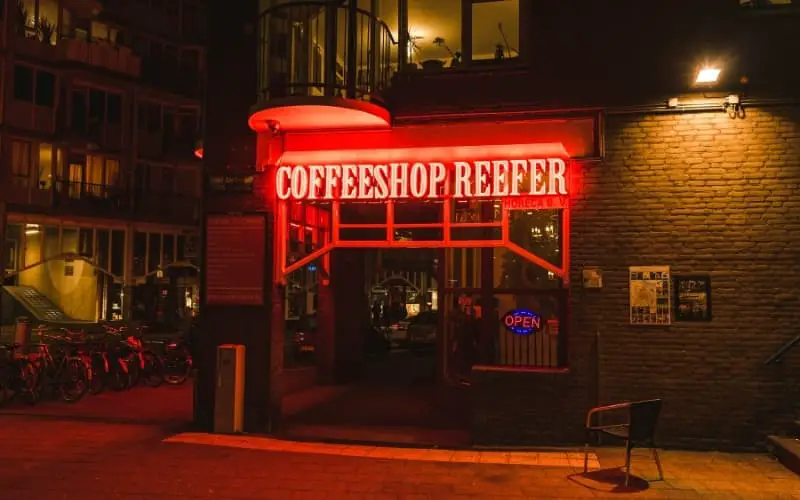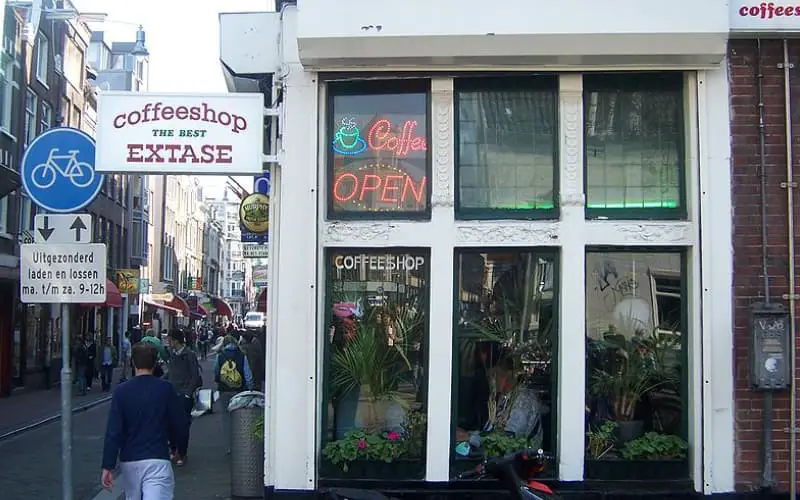

The Netherlands is one of the only countries worldwide with a tolerance policy towards the use of cannabis (weed). Many tourists come to the Netherlands looking to experience the effect of this small herb. Most people know what they can buy in Dutch Coffeeshops, but for those who don't, I will answer the question "what is a coffeeshop in the Netherlands?".
A coffeeshop in the Netherlands is a cafe where you can buy cannabis. It is a social gathering where the Dutch state tolerates the selling and use of soft drugs. Coffeeshops are the only places in the Netherlands where soft drugs such as cannabis are legally sold because of the tolerance policy.
Dutch coffeeshops bring about 4 million visitors to Amsterdam a year. Even though it is a well-known concept in the Netherlands, it is not always clear what a Dutch coffeeshop is, and especially what is tolerated by the state and what isn't. So definitely read on if you would like to learn more about the Dutch coffeeshops.
The first Dutch coffeeshop opened its doors in the city of Utrecht in 1968. The coffeeshop was called Sarasani, named after a youth society in Utrecht. In 1972 the first coffeeshop opened its doors in the capital of the Netherlands, Amsterdam. This coffeeshop was named Mellow Yellow, this was the first coffeeshop in Amsterdam that sold weed and hash in 1973, with today's concept.
The popularity of these kinds of cafes grew rapidly. In 1975 there were three Dutch coffeeshops in Amsterdam and one in the city of Utrecht.
As described above, a Dutch coffeeshop is a cafe that legally sells soft drugs, which are weed and hash. Coffeeshops are the only cafes in the Netherlands where there is a tolerance policy towards soft drugs. The coffeeshops are meant to be a nice place to come to, relax, and hang out with friends.
Depending on the cafe style, you can buy drinks and food like you would in any other cafe. The most significant difference between a "normal" cafe and a Dutch coffeeshop is that your neighbor is most likely smoking a joint next to you. Also, there is often the option of buying food that contains either weed or hash. Examples could be hash brownies or hash cookies.
As you can read above, they sell weed and hash in the Dutch coffeeshops, but what is the difference between those two?
Most people know that weed and hash are soft drugs. People often don't know that there is a significant difference between the two. That is why I will give you a short explanation about these two types of soft drugs.
Both weed and hash are products from the female Hennepplant (cannabis Sativa). The dried and crumbled flower buds and leaves are known as weed or marihuana. Hash comes from the trichomes found on the flower buds.
Weed is known for having more of a calming effect, whereas hash would make you feel higher. Not everyone reacts the same way to soft drugs, though. Also, each plant is different, which could automatically result in a different experience.

This is where it gets a bit complicated. Even though the Dutch state tolerates the soft drugs being sold to customers in coffeeshops, the coffeeshops themselves aren't legally allowed to buy the soft drugs from anyone.
In the Netherlands, for instance, you’re not actually allowed to have soft drugs in your possession, and the government does not take action against the trade in soft drugs by coffeeshops. However, growing cannabis is strictly prohibited.
You could then ask yourself, how do those coffeeshops get their weed? They buy exactly that from illegal nurseries. Also, the legal amount of soft drugs allowed in the shops is so small that most coffeeshops have way more stock.
All of this comes together under the so-called “tolerance policy”. This means that in some cases the Dutch government turns a blind eye, making this possible in the Netherlands.
This is a bit of a grey area that some Dutch citizens and governments have trouble with. Therefore there is a division between states, governments, and citizens regarding keeping Dutch coffeeshops open or closing them.
To combat the illegal trade in weed, the Netherlands has recently started regulating cannabis cultivation, for which special growers have been selected. In this way, the Netherlands is trying to combat crime related to the trade of weed.
For coffeeshops to be allowed to sell soft drugs to their customers, they have to follow specific rules or "tolerated criteria", which are:
Recently a new rule has been applied by the Dutch state. Only Dutch citizens that are registered in the Netherlands are now allowed to be inside coffeeshops. With this rule, the Dutch government hopes to bring down illegal drug trafficking within the Netherlands. This is unfortunate for the tourists that come to the Netherlands to visit a coffeeshop.
If a coffee shop owner does not follow the criteria, they will get fined, and their shop will be closed.
There are multiple stories and ideas about where the name "coffeeshop" came from, but this is the most credible story.
In the early 1970s, cannabis was mainly sold in coffee houses and tea houses in the Netherlands. These were places where people gathered to have a drink and to buy and use soft drugs. This was possible thanks to the Dutch government's tolerance policy for the sale of cannabis.
The places where the cannabis was sold were referred to as coffeeshops by the local people. Eventually, other newly opened coffeeshops took over this name and it became a popular household name.
Nowadays the name coffee shop is a household name all over the world and people know immediately what you are talking about, especially when you say it in combination with the Netherlands.
In 1997 the Netherlands counted 1197 different coffeeshops all over the country. Due to new laws, the amount has been reduced to a total of 548 coffeeshops today. One of these laws is that coffeeshops aren't allowed to be near schools and universities.
Although the total amount of coffeeshops in the Netherlands has been reduced over the years, it is not hard to find a coffeeshop in the Netherlands. Nearly every city has at least one, and often more than one operating coffeeshop.
To give you an impression, here are the top 3 cities in the Netherlands that have the largest amount coffeeshops.
If you are looking for a coffeeshop in a specific city, you can easily find them here.
Dutch coffeeshops are well known worldwide. This is because the Netherlands is one of the only countries with a tolerance policy of selling soft drugs in a cafe. I hope that after this blog, you have gained more knowledge about Dutch coffeeshops in general, and you got an answer to the question "what is a coffeeshop in the Netherlands?".